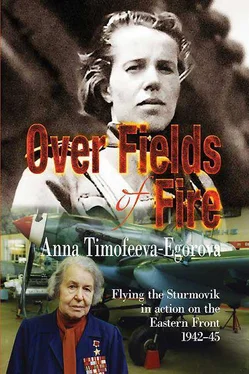In this letter my Mum prayed God to keep us, her children alive and to let the Red Army muster more strength and cleanse the Russian land of the evildoers…
The letters coming to the front were mostly encouraging. They wrote us from the home front that everything was going well with them, that they were provided with everything, that they were doing their best for victory over the bitterest enemy of humankind — Fascism. The most important message in the letters from the front was — one is alive, fit and giving the enemy hell. It was a sacred and just lie…
I received letters from Victor on the North-Western Front. Victor wrote that he was flying ‘small ones’ (that was what we called fighter planes during the war), that he had shot down nine German planes, that he had been awarded the Order of the Red Banner and two Orders of the Red Star. “When shall we meet again, Anya?” Victor asked, and answered himself, “After the Victory…”
I remembered for the rest of my life how a young radio operator burst into the squadron headquarters and shouted from the door, “Guys! The Germans around Moscow have been smashed!”
We, the pilots, began spinning in some fantastic dance. Revelry broke out in all the units. Everyone was laughing, singing, hugging each other — and tears were gleaming in people’s eyes… At last the Germans had stumbled! The victory near Moscow had not only military but also huge moral significance: all our spirits rose.
The winter campaign of 1942 was successful. The enemy was still very strong but the imperishable value of the first successes was that that they inspired us, instilling in us the spirit of belief in Victory. Those days this spirit was typical of all the troops on our Southern Front. Together with the troops of the South-Western Front they broke through the enemy defences at the Balakleya sector and formed the Barvenkovskiy Salient. Every frontline soldier was sweating on the success of the dashing raid by the two cavalry corps of Parkhomenko and Grechko on the Germans’ rear. In the winter cold, on the ice-crusted ground they spread panic in the Hitlerites’ camp with their sudden strikes. One encouraging dispatch after another was coming to Front headquarters via radio but suddenly the air waves fell silent. The commander needed to know exactly in which direction the corps could have moved after their last message had arrived. The commanders understood that the cavalry, exhausted in fierce combat and sleepless nights, needed rest. They had to be brought back, but how could it be done if the air waves were silent? “Let’s send a U-2”, The Southern Front Communications Commander General Korolev suggested.
A whirlwind was raging behind the misted windows but we — the Signals Squadron pilots — were up to the task… On one of those days of February when a blizzard had swept banks of snow all over the streets of the Filippenko hamlet I was called up to the squadron headquarters. They told me about the situation on our sector of the Front and ordered me to fly to the Barvenkovo Region where I would have to find Parkhomenko and Grechko’s cavalry corps and hand them over a package marked ‘Top Secret’. The Southern Front Communications Chief was to fly with me as far as Barvenkovo, but from there I would have to operate independently.
An angry wind was battering the machine. The engine was shivering as if in a fever and sometimes the wail of the wind drowned it out. All this was not a problem but how to break through the solid curtain of snow? It was endless, it had swallowed my small plane and held me tightly in its hands. Snow was clogging my goggles and was hitting me in the face. There was practically no visibility: I had only my intuition and experience to rely on. But there are moments when even they are powerless — and that was exactly what I felt on that day. But at last we were here in Barvenkovo. I delivered the General not far away from the railway station and was about to fly on. Climbing out of the cockpit the General leaned towards me, looked at me with his sad eyes and kissed the helmet on my head…
The snow was becoming thicker and thicker, the blizzard was getting stronger. In the cockpit I felt as if I were on a trapeze. All this taken together made it completely impossible to orient myself during the flight. What should I do? Return? But I had no right to take such a decision: I’d been ordered to keep flying and find the cavalry at any cost. Finding them would mean saving many thousands of lives… And I, finding any sign of a dwelling, would land my U-2 to learn who was there — friend or foe. Each time I had to land in extremely poor weather conditions. Airmen know what that’s like. I landed three times and three times I took off despite the winds and snowfall. I flew very low examining every gully, every ravine. I noticed tanks on one farmstead but I had not got a good look at them when they opened fire on me. But it turned out alright — the snowstorm saved me…
No one knows how my flight would have ended up had I not noticed horses in a gully. “Those are ours!” I closed in for landing and as soon as I touched down two soldiers in cavalry uniform ran up to me. So I was right! “Which corps?” — I asked them.
“General Parkhomenko’s 1st.”
“I’m from the Front headquarters. Which of the commanders is here?”
“The Head of Intelligence.”
An officer in a camouflage jacket was already walking towards me. He introduced himself as Head of Intelligence of General Parkhomenko’s 1st Cavalry Corps, and immediately told me the current situation, and I plotted the position of the 1st and 5th Corps on my flight map with barely visible pencil marks.
“Well done, pilot! See, you found us on a day like this. Give me the package, I’ll hand it over to the corps commander.”
“No, I have to do it myself”.
“Why ‘have to’?” The intelligence officer took a short pause and then laughed loudly and resoundingly. — I took you for an aviator but you’re an aviatrix! D’you want me to take you there?”
“No, I’ll find my own way.”
“Well, be careful”, he warned. “You’ll have to crawl for about a hundred metres up to that shed. The roundabout way through the ravine is too long and not safe: you can run into Germans…”
At last the package was handed over to a dog-tired General. He looked at the order and swore foully, not suspecting that standing before him in a flying suit and flying boots was a woman. A shell burst nearby. The explosion raised pillars of snow-dust, shaking the ground. Over our heads shrapnel whistled past, but the General continued to stand deep in thought. Then, turning to me, the General said decisively: “Here’s what to do. Shoot over to Grehcko in the 5th Corps, deliver my message to him and then fly to Front headquarters — bring us a radio set. We’ll do a bit more fighting here…”
“I won’t be able to do it before dawn, Comrade General — the plane is not equipped to fly at night.”
Another burst of cursing directed at the quartermasters who were lagging behind the Corps: the men and horses had nothing to eat. And on top of that the radio wasn’t working, he had sent a cart yesterday to Barvenkovo but it had disappeared. Continuing to curse, the General waved his hand in despair and suddenly asked “Have you caught cold or something? Your voice is kind of weak.”
“No…” I replied, took the envelope from his hands and asked: “What should I say at Front HQ?”
“What should you say?” The General said, still gritting his teeth. “Are you kidding, you greenhorn? Look what fire you’ve drawn down on us with your cropduster! You’re staying here with us…”
“But you’ve ordered me to deliver the package to the 5th Corps. I request permission to carry out the order.”
Читать дальше












